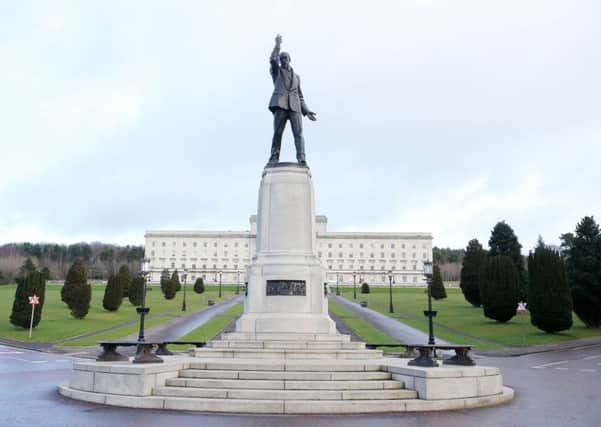Sam McBride: This Executive possessed more potential than all its predecessors. So why did it implode?


If there is a causal relationship between those two facts, it is a fundamental difficulty which will face all future Executives under this system of government.
And yet it can be a mistake to seek profound lessons from events which are essentially random – some of the evidence here suggests that a freak combination of events has combined to create the most unnecessary crisis in the history of devolution
Advertisement
Hide AdAdvertisement
Hide AdA series of factors have led Stormont to a brink over which it is likely to topple next week: Martin McGuinness’s sudden illness, the refusal of the media to stop digging into the RHI scandal, Arlene Foster’s obstinacy and the reintroduction of Gerry Adams into Stormont politics. If even one of those factors had been removed, it is unlikely that we would be where we are – at least at this juncture.
The Assembly and the Executive – institutions which have increasingly been derided by the public – have actually shown themselves capable of substantial, if slow, reform, with the move towards an Executive and Opposition and a much tighter DUP-Sinn Fein diarchy rather than the sprawling previous Executives.
For all the retrospective claims of recent days that Arlene Foster and Martin McGuinness did not gel, they actually had what was in public – and by all accounts in private at the Executive – a cordial relationship until recent events.
That extended to the DUP and Sinn Fein publicly joining forces in the Assembly to vote in ways which their supporters would have queried but which the parties’ leaderships thought important in order to maintain the strength of the coalition.
Advertisement
Hide AdAdvertisement
Hide AdIt may seem questionable now as to whether two parties with such radically opposing outlooks in areas as diverse as the constitution, social policy and fiscal outlook could ever realistically form a strong governing axis with agreed compromise positions while satisfying their core support.
If they cannot, then the cornerstone of the 1998 settlement – mandatory entitlement to Executive places (rather than mandatory coalition as it is often misdescribed) for all but the tiniest parties – is on borrowed time.
But for most of the last eight months they have certainly put on an impressive display of unity. That extended to the DUP conference – the party’s main opportunity to rally its base – where two of the veterans most likely to offend Sinn Fein were given minimal (Gregory Campbell) or no (Sammy Wilson) roles.
Therefore, despite the sudden re-writing of recent history, particularly by Sinn Fein, about how dire the situation has been, there was potential for this Executive to become the first coalition since the Agreement to really govern like a government, adopting the collective responsibility which would enable it to agree and enact a legislative programme of reform.
Advertisement
Hide AdAdvertisement
Hide AdThe Executive appeared to be particularly determined to radically reform a crumbling NHS in ways which would involve unpopular decisions such as the downgrading of some hospitals to centralise services in major centres of excellence as doctors have long been advocating – something consistently avoided by health minister after health minister.
That crucial work is now yet again abandoned.
The DUP’s appalling handling of the RHI scandal has placed intense pressure on the partnership, but Sinn Fein is clear that this is not the key reason for walking out of government and cites a long list of issues as well as what it sees as DUP arrogance in office.
Yet the extraordinary thing is that Sinn Fein had the chance to fight for every one of these issues – from gay rights to an Irish language act – during the negotiations about a programme for government.
If Sinn Fein had prioritised any one of the issues it now cites, it had a veto on an Executive being formed until they were conceded by the DUP. It is the same veto which Sinn Fein now loudly says it intends to use before allowing any future Executive to be formed.
Advertisement
Hide AdAdvertisement
Hide AdIn that scenario, Sinn Fein has a strong hand to play – particularly given the large number of DUP members politically and financially dependant on Stormont, given the ban on double-jobbing.
Yet there is also a fundamental weakness in its position. The party is ideologically against Direct Rule, the only feasible alternative if no administration can be formed.
Even before what are now likely to be weeks of a zombie Executive, areas of the NHS are in crisis, there is no Stormont budget for the next financial year, schools face serious financial pressures and infrastructure projects – supposedly one of the major commitments of this Executive – are now wildly uncertain.
Fast forward two months and if Sinn Fein is holding out for something such as an Irish language act before allowing an Executive to be formed while GPs are resigning and people are dying on trolleys in hospital corridors, public anger – across the political spectrum – could turn on republicans.
Advertisement
Hide AdAdvertisement
Hide AdAlready, there is a segment of the public yearning for a return to the old certainties of direct rule. Many people may come to think that an unaccountable ruler is surely better than no ruler. Sinn Fein could find itself simultaneously negotiating with the DUP and with an angry public.
Ultimately, the DUP and Sinn Fein know that they face a choice: Share power or lose power. Either of those options is now plausible in coming months.
See Ben Lowry, page 17